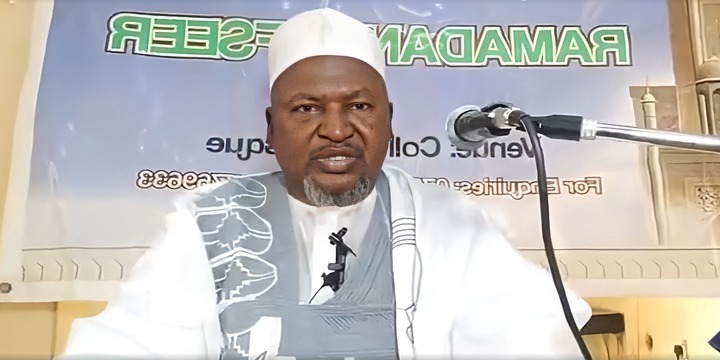Prominent Islamic cleric and educationist, Sheikh Umar Dada, has expressed strong concerns over an alleged plan by the Niger State government to introduce a certification process for religious preachers, requiring them to complete formal documentation and obtain approval before addressing any congregation, both in-person and online.
Speaking in an interview with News Central TV, Sheikh Dada revealed details of a recent meeting between government officials and Islamic religious leaders, where the issue of preacher regulation was reportedly discussed.
According to the cleric, he witnessed senior officials, including the Director-General of Religious Affairs, engage with a group of imams during what appeared to be a deliberation on the new policy framework.
“I saw the DG of Religious Affairs, and I saw him with a group of imams, many of whom I know personally,” Dada recounted. “They said they were just coming out of a meeting where it was decided that preachers in the state would be required to fill out forms and undergo an interview process before being certified to preach.”
The proposed policy, as described by the religious leaders present at the meeting, would introduce a formal vetting process for any individual intending to deliver sermons or religious teachings within Niger State.
According to Dada, those who fail to comply including individuals preaching via digital platforms could face penalties, although specific enforcement mechanisms remain unclear at this time.
“The idea is not just about speaking at the mosque,” Dada explained. “Even online preaching would be included. This makes it a serious matter for all of us.”
While the state government has not officially released any public statement confirming or denying the initiative, the news has sparked unease among some religious scholars and civil society advocates, particularly with respect to the potential implications for freedom of religion and expression.
Sheikh Dada has made it clear that he personally opposes the move and has no intention of participating in the process, citing constitutional rights as the basis of his objection
“In a democratic society governed by the rule of law, such requirements are unconstitutional,” he said. “No individual or agency has the legal authority to demand that religious leaders obtain permits before fulfilling their duties.”
Rather than impose sweeping regulations that could affect thousands of preachers across the state, Dada argued that a more targeted approach would be both more practical and constitutionally appropriate.
In an open letter addressed to Niger State Governor Umar Bago, he proposed an alternative solution.
“In my letter, I advised the governor to adopt a monitoring-based system. We already know those who hold regular preaching sessions, those who engage in Quranic exegesis, and those who lead Friday sermons. Instead of forcing every preacher to register, the government should monitor existing activities and only intervene when something clearly violates public order or promotes extremism,” he stated.
Dada warned that a blanket policy requiring all religious preachers to seek formal approval would not only be difficult to enforce but would also overburden an already stretched administrative system.
“This is a government that has to deal with healthcare, education, security, infrastructure, the list is endless. Now, add the task of regulating and certifying every single preacher in the state? It’s not feasible,” he said. “And even if it were, it would infringe upon rights guaranteed by our constitution.”
The cleric’s remarks come at a time of heightened sensitivity around religious freedom and state regulation in Nigeria, where religion plays a central role in both public and private life.
Across the country, attempts by state actors to exert influence over religious affairs have often drawn backlash from both Christian and Islamic groups, who argue that such measures risk politicizing faith and violating fundamental freedoms.
Though the Niger State government has yet to issue an official response to the claims or to Dada’s open letter, the issue is already generating significant public discourse, especially among religious communities who fear that their activities may soon be subjected to bureaucratic scrutiny.

Legal experts and human rights advocates have also begun weighing in on the matter. Some have suggested that any policy requiring preacher certification would need to pass through the state legislature and be subjected to judicial review, while others warn that vague or overly broad language in such proposals could lead to abuse.
As conversations continue, Sheikh Umar Dada remains steadfast in his stance. “We must uphold the values of a democratic society,” he said. “Preachers are not criminals. If someone preaches violence or incitement, the law is already there to take care of that. But creating hurdles for everyone, that is not the way forward.”
